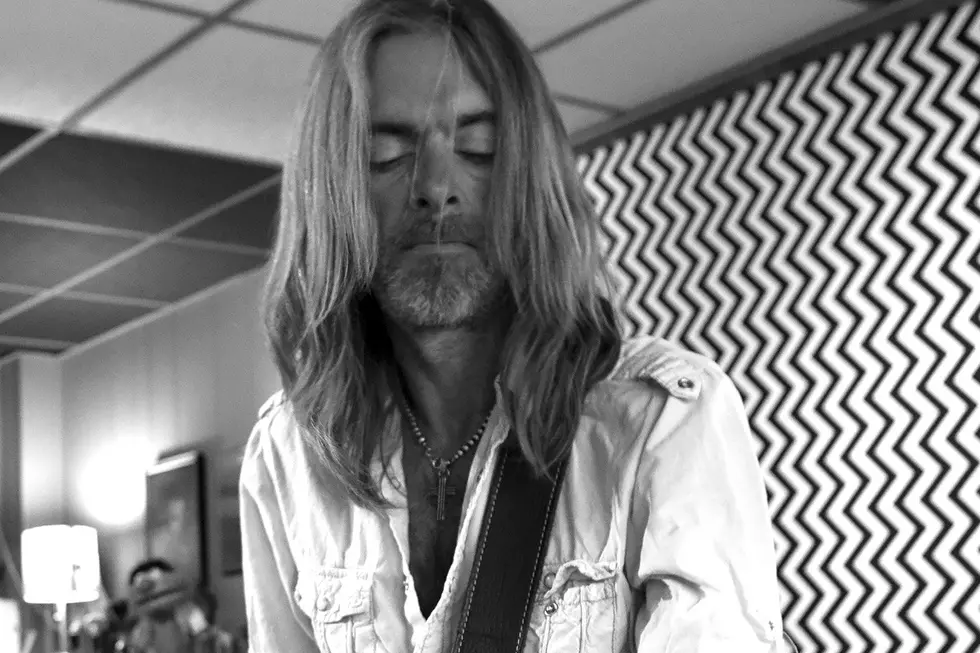10 Years Ago: Down Dig Deep Inside With ‘Down III: Over the Under’
Fans were becoming impatient and frustrated in the seven years between Down’s debut, NOLA, and its follow-up, Down II: A Bustle in Your Hedgerow, since there was next to zero activity other than a handful of live dates when the first album came out. Things were much different by the time Down III: Over the Under was released on Sept. 25, 2007, an interim where the metal supergroup had become a full-time focus for its members.
Frontman Phil Anselmo and bassist Rex Brown had set aside Pantera for Down; guitarists Pepper Keenan and Kirk Windstein of Corrosion of Conformity and Crowbar, respectively, dedicated less and less time to their projects, as did drummer Jimmy Bower with his band, Eyehategod.
And while fans may have embraced the turn of events, it wasn’t without its ramifications, mainly the tragic murder of Pantera's Dimebag Darrell in 2004, which not only spelled the conclusive end of that band but also severed the relationship between Anselmo and Darrell's brother, drummer Vinnie Paul. Then the band had each of their lives irrevocably altered in the wake of Hurricane Katrina, the Category 5 storm that destruction to their native New Orleans region. Both events greatly influenced the material that would turn into Over the Under.
“All of us had to recover from Katrina and this and that,” Anselmo pointed out in an interview a few years later. “But it brought us closer and it shows on [the album].”
The most immediate reference to Katrina is one of the standout tracks on the LP, the churning and almost Led Zeppelin-like “Beneath the Tides,” which reflects on the wreckage wrought by the hurricane in its opening lines: “Setting sail from a crushed rooftop / Fathoms deep, shallow as a raindrop.”
There are moments of hope – or at least a sign of New Orleans' resilience – on the rapid grinding “On March the Saints,” which finds Anselmo doing some of his best vocals as he spits out lyrics like “There's no such thing as a good time for bad luck / As minutes turn to distressed fragmented moments.”
“It really, really puts the exclamation point on the survivors of Katrina and really how amazingly devastating it is to lose everything that you own, and be surrounded by families from the ghettos, from wealthy homes, all bundled together,” Anselmo said. “And then at that point, we are absolutely equal.”
The singer would go on to talk about how the word “Katrina” means “cleansing,” and, how to many people close to him, the storm did end up performing some sort of cleanse, making them better people in the end.
Anselmo was less willing, at least at first, to talk about the songs that were about Dimebag Darrell. On “I Scream,” he sings about being scorned, the victim of a witch-hunt and how he can't help but to feel regret. Album opener “Three Suns and One Star,” a reference to the late Pantera guitarist, isn’t as lyrically obvious.
“’Three Suns and One Star’ is absolutely, positively inspired by the memory of Darrell,” Anselmo said. “’I Scream’ is about the division of myself and all the people that I miss in Texas. Honestly, it’s about the division of Vinnie Paul and all of us, me especially, and I don’t understand where the hatred comes from. Not that kind of hatred. I feel pity for him and I feel compassion for him, but he has to understand that Dimebag was as much my brother and Rex [Brown]’s brother as well. We sweated it out as well in those damn practice rooms, vans, tiny clubs, man ... that’s what that song is about. ‘I Scream’ is about the division.”
Then there is the heartbreaking “Mourn” about Anselmo’s journey to Dallas for Darrell’s funeral, where he was told he was not welcome. The song recalls Anselmo sitting in a hotel room waiting desperately for a call that never came and how he was left to speak his own sermon about Dimebag “in a sacred empty space.” "That's a very hard, hard song for me to really … honestly, the song speaks for itself," Anselmo would say in one of the few times he commented on “Mourn.”
Musically, Over the Under revives the more urgent sound than the often slowed-down sludge of its predecessor. The frenetic Black Sabbath nick on “Pillamyd” and thumping blast of “N.O.D.” are two examples. The interplay between Windstein’s endless supply of riffs and Keenan’s occasionally more languid moments winds itself tightly throughout the album.
There are also some brilliant blues-based moments, further complemented by Anselmo’s concentration on singing and not relying on his usual scream. “Never Try” and the epic “Nothing in Return (Walk Away)” could be two of his finest performances at the microphone ever.
Masterpieces: The Very Best Albums From More Than 100 Classic Rock Acts
More From KYBB-FM / B102.7










